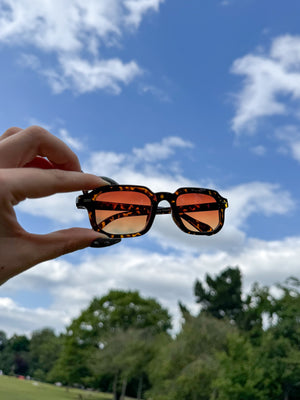
10 Ways You Can Help The Environment Today
Posted by Jared Boxem on
When it comes to helping the environment, there are many ways we can make a difference. The best way to reduce your carbon footprint is to start with small changes to your daily routine & shopping habits; the following list provides accessible and achievable ways to make a difference within a day.
1. Eat Sustainably
Helping the environment means reconsidering our day-to-day choices and questioning whether they are in-line with a sustainable lifestyle. Regardless of factors such as meat consumption, everyone is capable of making small changes to their eating habits. Whether you shop from a local farmers market or your nearest supermarket, choose seasonal fruit and vegetables sourced nationally (if not locally). Different meats have different levels of impact on the environment; similar to fresh produce, try and choose meat that has been reared locally. Turkey and chicken provide the lowest carbon footprint and water consumption with 2.33kg of CO2 per kilo of meat, whereas pork produces 4.62kg of CO2 per kilo of meat, and beef produces over 3 times the amount of CO2 as pork[1]! For today’s meals, choose the more sustainable option and maybe even try out a new recipe for dinner.

[1] https://www.ecoandbeyond.co/articles/most-environmentally-friendly-meat/
2. Use Public Transport
As well as being a crucial part of urban life and culture, the environmental benefits of public transport make it an integral part of lowering your carbon footprint; for example, did you know a bus carrying as few as seven passengers is more fuel efficient than a car carrying one person? And that a fully occupied train is fifteen times more fuel efficient than a car?[1] Neither did we. Other public transport schemes such as trams, bike-sharing schemes and park and ride schemes provide a versatile way for you to navigate the city. For areas with less accessible public transport, try carpooling apps such as blablacar and UberPool - you may even meet like minded people in this way that you wouldn’t have otherwise. If you have to commute today, why not try a new and more environmentally friendly way?

A bike-sharing scheme in a city // image via Unsplash
3. Conserve Water
Water is undeniably one of the most precious resources on the planet. The ease with which we can access water in a home can make it hard to understand the problems that would occur if this resource ran out. When using water in the home, there are a number of reasons to reduce your consumption such as saving money on your water bill and reducing your environmental impact. To take action on your water consumption today, there are a few steps you can take; a) fix any leaky taps you are aware of to stop what could be up to 60 litres of wasted water running down the drain each day, b) turn the tap off when you brush your teeth and save up to 6 litres per minute, c) boil only the water you need for each cup of tea or coffee rather than filling the kettle each time and d) when washing clothes ensure the machine is full as a fully-loaded machine uses less water and energy than two half-loads[1].

A tap running unnecessarily // image via Unsplash
4. Buy Vintage And Second Hand
Flex your vintage fashion know-how and get down to your local thrift store, car boot sale, or local clothes swap-shop and get your hands on some vintage treasures. Not only is it a great way to spend an afternoon and a cheap and easy way to freshen up your wardrobe while keeping it unique, but the fashion industry is a huge contributor to climate change due to the vast amounts of water used in production and the miles racked up transporting these goods all over the world. Secondhand clothing doesn’t necessarily mean a charity shop either - sites such as Depop and Poshmark specialise in unique, often vintage, items that are being resold. Grab a bargain and look fresh; a win-win-win for you, the environment and your wardrobe. With up to £30 million worth of clothes sitting unworn in UK wardrobes, you could even make some money reselling your own old items[1]. Designer shirts and dresses, one-off items and customised pieces can go for good prices on reselling apps; another win for your wallet. In terms of environmental impact, clothing comes fourth after housing, transport and food - if you’ve already started to make changes in these areas, sustainable clothing should be your next goal.

Searching through a charity shop rail // via Unsplash
5. Reduce Food Waste
With so much food at our fingertips, from greasy takeaways to quick healthy pasta dishes, it’s easy to forget about leftovers or find ourselves unable to finish a meal. These small portions which often get thrown away cumulate on a global scale and as a result almost one-third of all food produced globally is wasted or spoiled[1]. Fruit and veg wilt, leftovers congeal in the fridge and loaf after loaf of stale bread is thrown away. By planning your meals ahead food waste can be minimised - having a weekly meal plan and shopping list streamlines your food shopping meaning you are less likely to waste money on food that won’t be eaten. Research how specific food items should be stored - some fruit and veg prefer to be room temperature while others prefer the cool of the fridge; getting this wrong can impact the lifespan of the food, thus contributing to waste. If you have access to a garden start your own compost heap and if you don’t, enquire into community gardens in the area to find out if they have compost heaps which you can contribute food scraps into. Of course, if you want to go a step further, you could even start growing your own food - kitchen herbs from your supermarket are an easy introduction into growing and caring for plants.

Food being correctly stored // image via Unsplash
6. Take Reusable Bags With You
With plastic bags costing up to 50 pence in the UK in an attempt to discourage their use, it pays to bring a reusable bag with you as it benefits both your wallet and the environment. While the term 'reusable bag’ conjures to mind images of kitschy tote bags and clunky supermarket ‘bags for life’, really it just means having a backpack or shoulder bag you can pack things into until you’re home from the stores. Get into the habit of taking a bag with you whenever you go out, even if just to carry your phone and wallet, and you’ll soon find you never leave home without it. Backpacks are also much easier to carry than multiple plastic bags digging into the palms of your hands as you try to walk them back home and are considerably more fashionable as well. If buying a backpack new, seek out sustainable brands which promise quality and longevity or visit your local charity shop for a bargain.

Carry a backpack with you // image via Unsplash
7. Walk
What activity provides the following benefits; a healthier lifestyle, minimal environmental impact, improved mental wellbeing and the opportunity to explore for free? Walking is the answer! Cheaper than any other kind of transport (because it’s totally free), more environmentally friendly than any other kind of transport (with 0 carbon production) and proven to be beneficial for your health and mind, walking anywhere is an improvement on driving or even public transport. By walking to work (or cycling if it’s too far to walk) you not only get your heart pumping but it also lowers your blood pressure, reduces cholesterol, reduces the risk of heart disease and strokes and even enhances your mental wellbeing[1]. With all of these benefits, as well as the opportunity to see some of the great outdoors, it just makes sense to get your walking shoes on and head out - especially given the popularity of outdoor wear brands such as Patagonia and North Face.

Walking is the healthy and sustainable option // image via Unsplash
8. Recycle Your Old Mobile
Recycling and reselling old phones should be done with the intention to keep them out of landfills for as long as possible. The first step is to take good care of your phone to reduce the frequency with which you need to buy a new handset - a sturdy phone case and screen protector should elongate the lifespan of your smartphone. With the popularity of phone contracts, you may find yourself with a new phone upgrade before your old phone has given up - in this case, the best thing to do is to sell your old handset. With a huge secondhand market, phones can be sold on sites such as eBay or you can trade them in at a pawn shop or tech brokers for cold, hard cash. A good quality, well maintained handset will hold it’s value well and you should get a healthy price for your phone. However, if your phone is past the point of repair, look into phone recycling companies rather than just chucking it in the bin. In the UK alone, 30 million new phones are bought every single year[1]. Consider buying a secondhand phone for yourself next time your contract expires.

A smartphone in use // image via Unsplash
9. Take Your Own Cup/Bottle
Not only does your reusable travel mug/water bottle signify to the outside world that you are a responsible consumer of resources, but it can also be a signifier of your style and fashion. Water bottle producer Evian paired up with designer Virgil Abloh to create a highly stylised reusable glass bottle for sale at Selfridges and brands such as S’well are making a name for themselves as designed-based reusable bottle manufacturers. The benefit of these fashion accessories to the environment is significant, as plastic water bottles can be found in waterways all over the world and cause problems for wildlife and fauna. Reusable coffee mugs come in all shapes, sizes and colours meaning if you really wanted you can even coordinate your outfit with your chosen travel mug! When it comes to disposable coffee cups, despite many believing they are fully recyclable, the statistics reveal on average only 1 in 400 cups is successfully recycled[1]. When the situation is that dire, the responsible thing to do is take your own mug to your favourite coffee shop - many even offer discounts as an incentive, so you’ll be saving money as well!

A woman drinking from a reusable coffee mug // image via Unsplash
As demonstrated, reducing your environmental impact doesn’t have to mean taking huge and drastic action (although if that’s the route you take we applaud you). Small, continuous changes such as reusable cups and secondhand clothes provide attainable and achievable ways to reduce your carbon footprint. Not only is there money to be made and saved by being environmentally conscious, there is the added benefit of saving the planet as well!
10. Talk
The best thing anyone can do to reduce their carbon footprint is simply consume less and encourage this behaviour in others as well. Less food, less clothes, less resources . We don’t need a few people to be the perfect environmentally aware consumers, we need everyone to be imperfect environmentally aware consumers. You are the person best placed to convince your family and friends that we all need to take action on climate change.

People Talking // image via TJ Magazine
Links & References:
- https://www.ecoandbeyond.co/articles/most-environmentally-friendly-meat/
- https://greentumble.com/environmental-benefits-of-public-transportation/
- https://friendsoftheearth.uk/natural-resources/13-best-ways-save-water-heatwave-or-no-heatwave
- https://www.theguardian.com/fashion/2019/feb/19/dont-feed-monster-the-people-who-have-stopped-buying-new-clothes
- https://mashable.com/2015/02/15/food-waste-tips/?europe=true
- http://www.energysavingsecrets.co.uk/walking.html
- https://www.greenredeem.co.uk/greener-living/lifestyle/mobile-phone-recycling-tips
- https://www.stylist.co.uk/life/buy-best-reusable-coffee-cups-uk-environmentally-friendly-waste-sustainable/200466
- https://todayshomeowner.com/eco-friendly/guides/saving-water-at-home/
All images sourced via unsplash.com





